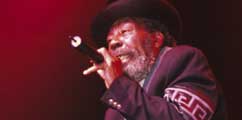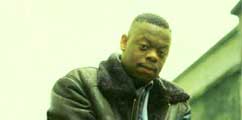- No toasting … no rap. Jamaican deejay style is the founding father of American rap.
- In 1970 the top five positions in the Jamaican hit parade were held by deejay records and producers of singers complained so loudly, deejay records were banned from the Top 20.
- Jamaican deejay culture is the driving force behind UK garage and jungle MC vocal styles.
 |
 |
| Forty years ago, if you had a
sound system you wouldn’t have dreamt of charging people
admission to your dance if you didn’t have decent deejay on
the mic, vibing up the crowd, bouncing off the records with
his whooping and shouting, toasting the sound system itself.
This was one more example of Jamaicans "borrowing" something
from elsewhere and vastly improving it as they made it their
own the sort of wild scatting and jive talking that was
"borrowed" from the jocks on black American radio stations
powerful enough to reach Jamaica from Miami and New Orleans.
But as deejays like Count Machuki, Sir Lord Comic and King
Stitt became the main attraction at a dance, it was only a
matter of time before they started recording. When a generation of deejays, led by U-Roy, Dennis Alcapone and Scotty began cutting records, they revolutionised Jamaican music. As producers started leaving gaps in the mix or leaving one side blank (the version) deejays then closed the gap between the crowds and the artists. They did this by going straight from the sound system dance to the recording studio where they accurately reflect, in rhyme, the life the saw going on around them – the styles, the dances, the slangs, the politics and so on. Hardly surprisingly, the roots era was heralded by deejays like Big Youth, Jah Stitch, I Roy, Prince Jazzbo, Trinity and Dr Alimantado who gave the new wave a voice with their conscious toasting on the sound systems before any producers would record them. Likewise dancehall, the first big stars that style produced were the deejays Yellowman, Josey Wales, General Echo and Charlie Chaplin as, on the sound systems, they could respond to what the audience really wanted much faster than the recording industry. Indeed dancehall was a style made for the deejay and in the wake of Shabba Ranks’s global success it seemed dancehall had become deejay dominated, and today its biggest stars are the likes of Beenie Man, Bounty Killer, Lady Saw and Sizzla. Jamaican deejaying didn’t just provide the template for rap either – an irony in itself as the idea went from the USA to JA 20 years previously – the MC styles of UK garage, drum’n’bass and jungle owe more to reggae than they do to rap. Quite apart from the likes of So Solid Crew, Mis-Teeq and General Levy all growing up around reggae, the big reason is that Jamaica drives British street slang with its words, rhythms and sentence construction, meaning MCs will always lean more towards Kingston than New York. | |
|
Next chapter: Pop
Reggae | |